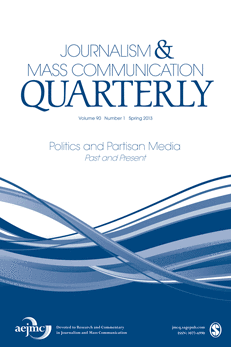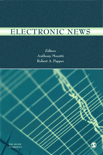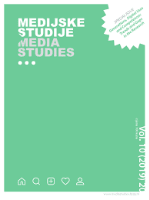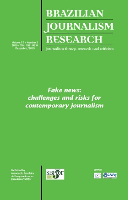
Pacific Journalism Review
Scope & Guideline
Illuminating Media Landscapes Across the Pacific.
Introduction
Aims and Scopes
- Pacific Journalism and Media Freedom:
The journal emphasizes the importance of media freedom and the role of journalism in promoting democratic values and social justice, especially in the Pacific context. - Cultural and Indigenous Perspectives:
It highlights the significance of cultural narratives and indigenous voices in journalism, aiming to represent the diverse experiences and realities of Pacific communities. - Impact of Technology on Journalism:
The journal explores how technological advancements, particularly digital media and social networks, are transforming journalism practices and media consumption in the Pacific. - Critical Analysis of Global and Local Events:
It provides critical insights into major global events and their local implications, particularly focusing on conflict, migration, and environmental issues affecting the Pacific region. - Education and Training in Journalism:
The journal discusses challenges and innovations in journalism education, including the development of curricula that address current media landscapes and ethical considerations.
Trending and Emerging
- Post-Pandemic Journalism:
There is a growing focus on how journalism is adapting in the post-pandemic landscape, particularly regarding employment, mental health reporting, and the role of technology in news dissemination. - Social Media's Role in Journalism:
The increasing influence of social media platforms on journalism practices is a prominent theme, with papers examining social media's impact on political engagement and public discourse. - Environmental Journalism:
Emerging discussions around climate change and environmental issues are becoming more prevalent, reflecting a global urgency to address ecological crises and their implications for Pacific communities. - Indigenous and Community Journalism:
There is a rising interest in indigenous journalism and community-driven media projects, highlighting the importance of local narratives and the need for representation in mainstream discourse. - Media and Conflict Reporting:
Recent publications are increasingly exploring the complexities of reporting in conflict zones, particularly in relation to the Pacific region's geopolitical dynamics and issues of global significance.
Declining or Waning
- Traditional Journalism Models:
There is a noticeable decrease in papers focused on traditional journalism models, as the discourse shifts towards more adaptive and innovative approaches in response to the digital landscape. - Focus on Mainstream Media Critique:
As alternative media and grassroots journalism gain traction, the journal's emphasis on mainstream media critiques appears to be less frequent, reflecting a broader change in media consumption and production. - Historical Retrospectives:
There has been a reduction in research focused solely on historical analyses of journalism practices, as more emphasis is placed on contemporary challenges and future directions in the field. - Regional Conflicts without Local Context:
Papers that analyze regional conflicts without integrating local perspectives or implications are becoming less common, signaling a shift towards more contextually relevant and community-focused journalism. - Generic Media Ethics Discussions:
Discussions around media ethics are increasingly being tailored to specific regional challenges rather than general principles, leading to a decline in generic ethical discussions.
Similar Journals

JOURNALISM & MASS COMMUNICATION QUARTERLY
Connecting scholars to the heart of mass communication.JOURNALISM & MASS COMMUNICATION QUARTERLY, published by SAGE PUBLICATIONS INC, stands as a premier platform for scholarly discourse in the fields of journalism and mass communication. With an impressive Q1 ranking in the Communication category for 2023, this journal serves as an essential resource for researchers, professionals, and students seeking in-depth analysis and insights into contemporary media landscape challenges and evolutions. Its comprehensive scope, encompassing studies from as early as 1955 through 2024, provides a rich repository of historical and current research, ensuring a continuous dialogue about the impacts of media on society. Although not an Open Access journal, it remains highly regarded, evidenced by its Scopus rank of #41 out of 511 in the Communication field and a remarkable 92nd percentile ranking. As a critical resource, it contributes significantly to advancing academic knowledge and practical applications in journalism and mass communication.

Electronic News
Pioneering Research for a Digital News Revolution.Electronic News, published by SAGE PUBLICATIONS INC, stands at the forefront of scholarly communication, focused on the dynamic intersection of media, technology, and society. With an ISSN of 1931-2431 and an E-ISSN of 1931-244X, this journal has established itself as a valuable resource for academics and professionals alike, exploring critical themes in communication and information systems. Operating from its base in the United States, Electronic News operates within a competitive landscape, boasting a commendable Q2 ranking in Communication and a Q3 ranking in Information Systems. This reflects its commitment to high-quality research and impactful insights, as evidenced by its Scopus rankings, where it ranks #238 out of 511 in Social Sciences Communication and #302 out of 394 in Computer Science Information Systems. Although currently embracing a traditional subscription model, the journal serves as a crucial platform for disseminating knowledge that shapes the future of news and media in a rapidly evolving digital age. As it converges from 2009 to 2024, Electronic News continues to invite contributions that address the multifaceted challenges and innovations of news media, making it an essential resource for researchers, practitioners, and students eager to engage with contemporary issues in communication.

Index Comunicacion
Bridging theory and practice in communication studies.Index Comunicacion is a distinguished open-access journal published by UNIV REY JUAN CARLOS, FAC CIENCIAS COMUNICACION, located in Madrid, Spain. With an ISSN of 2444-3239 and an E-ISSN of 2174-1859, this journal has been disseminating knowledge in the fields of communication, visual arts, and performing arts since its inception in 2011. Index Comunicacion has garnered an impressive reputation, achieving a Q2 ranking in Communication and a Q1 ranking in Visual Arts and Performing Arts as of 2023. Furthermore, it ranks notably at #46 out of 667 in Visual Arts and Performing Arts, placing it in the 93rd percentile, while also holding a rank of #236 out of 511 in the Communication category, in the 53rd percentile. With a commitment to fostering scholarly communication and contributing to academic discourse, the journal provides a platform for researchers, professionals, and students interested in innovative perspectives and crucial advancements within these dynamic fields. Emphasizing a forward-looking approach, Index Comunicacion is poised to serve as a valuable resource through its converged issues spanning from 2019 to 2024.

Doxa Comunicacion
Disseminating impactful research for a global audience.Doxa Comunicación is a prominent open-access journal dedicated to advancing the field of communication studies, published by Universidad San Pablo CEU, under the Faculty of Humanities and Communication Sciences. Established in 2003, this journal has gained recognition for its commitment to disseminating high-quality research and thought-provoking articles, fostering a vibrant academic community. With an ISSN of 1696-019X and an E-ISSN of 2386-3978, Doxa Comunicación occupies a vital niche in the academic landscape of Spain, contributing to both national and international discourses. In the 2023 rankings, it is categorized in the Q3 quartile within the fields of Communication and Social Sciences (miscellaneous), reflecting its competitive standing among peer publications. The journal's diverse scope, including contemporary communication theories and practices, ensures relevance for researchers, professionals, and students alike. With a Scopus rank of #333 in Social Sciences (miscellaneous) and #291 in Communication, Doxa Comunicación serves as an essential platform for innovative research that addresses the complex challenges of modern communication in a rapidly evolving society.

Medijske Studije-Media Studies
Connecting Global Perspectives on CommunicationMedijske Studije-Media Studies, an esteemed journal published by SVEUCILISTE & ZAGREBU, FAK POLITICKIH ZNANOSTI, is a pivotal platform in the field of communication studies and media research. Established in Croatia, this Open Access journal since 2010 features a diverse array of research articles that explore the multifaceted relationships between media and society. With its ISSN 1847-9758 and E-ISSN 1848-5030, the journal serves an international audience and is committed to disseminating innovative insights that drive media scholarship forward. Currently ranked in the Q3 category in Communication and Q4 in Computer Science Applications for 2023, it reflects its growing influence, capturing vital trends and analyses that resonate in both academic and practical realms. The journal's Scopus rank sits at #337 out of 511 in Social Sciences_ Communication, placing it within the 34th percentile, thus establishing its relevance in the global discourse on communication. Researchers, professionals, and students are encouraged to engage with this resource as it continues to forge connections between media studies and contemporary societal issues.

Journalism Studies
Fostering Critical Insights for Journalism's Next EraJournalism Studies is an esteemed academic journal dedicated to advancing the field of media and communication, and it has established itself as a leading platform for innovative research in this dynamic discipline. Published by Routledge Journals, Taylor & Francis Ltd, this journal boasts an impressive Q1 ranking in Communication in 2023, reflecting its significant impact and contributions to the field, currently holding a Scopus rank of 64 out of 511 in Social Sciences Communication, placing it in the 87th percentile. Covering a rich spectrum of topics from journalism ethics to the role of technology in news dissemination, Journalism Studies aims to foster scholarly debate and provide critical insights that shape the future of journalism. With ongoing research spanning from 2001 to 2024, it serves as an essential resource for researchers, professionals, and students seeking to enhance their knowledge and engage with contemporary issues in journalism. For those looking to stay at the forefront of media studies, this journal represents a vital source of quality research and scholarly dialogue.

Vestnik Moskovskogo universiteta. Seriya 10. Zhurnalistika
Transforming Understanding of Media's Social ImpactVestnik Moskovskogo universiteta. Seriya 10. Zhurnalistika, published by the prestigious M V Lomonosov Moscow State University, serves as a vital conduit for scholarly discourse in the fields of journalism and communication. With an ISSN of 0320-8079 and an E-ISSN of 0320-8079, the journal showcases rigorously peer-reviewed research and theoretical contributions that span diverse aspects of media studies, social communication, and journalism ethics. As of 2023, it is classified within the Q3 category in both Communication and miscellaneous Social Sciences, ranking #372 out of 511 and #445 out of 604, respectively, indicating its growing influence and relevance in these crucial academic domains. Despite not being Open Access, researchers and students alike can leverage the journal's valuable insights, which continue to shape contemporary understanding of media's impact on society. With a commitment to excellence and a focus on the rapidly evolving landscape of journalism, Vestnik Moskovskogo universiteta. Seriya 10. Zhurnalistika remains an essential resource for anyone looking to engage deeply with current debates and developments in the communication field.

Theoretical and Practical Issues of Journalism
Illuminating the Path for Emerging Voices in JournalismTheoretical and Practical Issues of Journalism is a prestigious journal published by Baikal State University, that explores a broad spectrum of topics within the field of journalism. With an ISSN of 2308-6203 and an E-ISSN of 2308-6211, this journal commits to advancing the discourse in both theoretical frameworks and applied methodologies that shape contemporary journalism practices. Although it operates under an open-access model, aiming to enhance accessibility for researchers, professionals, and students worldwide, the journal does not currently display an H-index, reflecting an exciting opportunity for early career researchers to contribute to building its impact. Situated in Irkutsk, Russia, the journal serves as a vital platform for the dissemination of innovative research and critical analysis, aimed at addressing the evolving challenges in journalism today. Its scope encompasses interdisciplinary studies, media ethics, digital journalism, and the socio-political dynamics impacting the news landscape, making it an invaluable resource for anyone vested in the field. As the media environment thrives amidst rapid technological changes, Theoretical and Practical Issues of Journalism remains essential for fostering dialogue and encouraging scholarly efforts that respond to these shifts.

Brazilian Journalism Research
Illuminating the Future of News in BrazilBrazilian Journalism Research is a leading platform in the field of communication studies, focusing on the dynamic landscape of journalism in Brazil and beyond. Published by SBPJOR, this open-access journal has been committed to scholarly dissemination since 2005, facilitating a diverse array of research that informs both academic and professional practices. With an ISSN of 1808-4079 and an E-ISSN of 1981-9854, the journal explores critical issues within journalism, including media practices, policy analysis, and the social implications of news dissemination. Recognized in the Q3 quartile of Communication as per 2023, it ranks 324 out of 511 in the Scopus social sciences communication category, highlighting its growing reputation amidst an evolving field. The journal's commitment to quality research is further exemplified through its converged years from 2018 to 2024, which enables it to analyze contemporary trends and future directions. Researchers, professionals, and students alike are encouraged to access this journal to enrich their understanding and engagement with Brazilian journalism scholarship.

Revista Mediterranea Comunicacion-Journal of Communication
Exploring the Dynamics of DialogueRevista Mediterranea Comunicacion - Journal of Communication, published by UNIV ALICANTE, stands as a significant platform for scholars and practitioners in the fields of Communication and Cultural Studies. With an impact factor that firmly places it in Q2 for Communication and Q1 for Cultural Studies, this open-access journal promotes scholarly dialogue through a rich array of articles, encouraging international discourse that spans various cultural and communicative phenomena. Since its inception in 2010, the Revista Mediterranea Comunicacion has made substantial contributions to understanding contemporary communication dynamics, supported by a growing reputation evidenced by its commendable Scopus rankings—144th in Cultural Studies and 181st in Communication. Researchers, professionals, and students are invited to explore and contribute to this journal, further enhancing the understanding of communication within diverse social contexts.